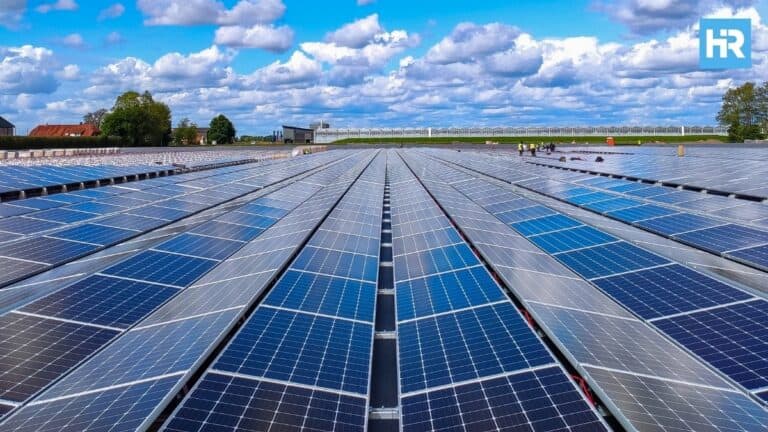
Sauk Solar Park, Michigan’s largest solar project, has officially begun powering homes from its location in Union City, Branch County.
Built by DTE Energy, it covers 900 acres and runs on 347,000 solar panels, generating 150 megawatts of power.
And that’s enough to power about 40,000 homes!
Although, this project isn’t solely about flipping the switch on more solar panels.
It’s part of DTE Energy’s ambitious plan to boost Michigan’s renewable energy, lower carbon emissions, and create lasting benefits for the local community.
- Sauk Solar Park covers 900 acres, using 347,000 panels to generate power for about 40,000 homes.
- The project created over 350 jobs and offered local farmers extra income by leasing their land for solar panels.
- Sauk Solar is part of DTE’s plan to cut carbon emissions and add more renewable energy, aiming for net-zero emissions by 2050.
Sauk Solar Park Powers Michigan with Clean Energy
Sauk Solar Park is a huge facility—more than three times the size of DTE’s previous largest solar farm in Lapeer.
DTE Energy, a leader in Michigan’s energy industry, has developed this park as part of its CleanVision MIGreenPower program, which allows customers to support renewable energy.
With over 100,000 residential and nearly 2,000 business customers already signed up, this new solar park is an important addition to Michigan’s clean energy transition.
At 150MW, Sauk Solar is a significant achievement in Michigan’s drive for sustainable power.
This facility alone can provide renewable energy to thousands of homes and reduce the need for coal and other traditional energy sources.
It’s also the first of six new solar parks DTE plans to open by 2035 to meet a 60% clean energy target.
This new series of projects aligns with DTE’s goal of achieving net-zero carbon emissions by 2050, helping Michigan take the lead in renewable energy.
Job Creation and Community Support
Aside from producing clean energy, Sauk Solar Park also brings substantial economic benefits to local communities.
The project generated over 350 jobs during construction, providing employment and strengthening the local economy.
Since 2009, DTE’s renewable energy projects have contributed over 20,000 jobs to Michigan, and Sauk Solar continues that positive trend.
Furthermore, these jobs create ripple effects in the local economy as workers spend their earnings at area businesses.
In turn, the economic benefits are felt in local stores, restaurants, and other services that support the community.
Renee Tomina, senior vice president of project management at DTE, emphasizes how these jobs bring real financial benefits to the community.
Additionally, DTE worked closely with Branch County officials and built strong local partnerships as they developed the project.
Community leaders have appreciated this approach, and it reflects DTE’s commitment to making a long-term impact.
Benefits for Local Farmers and Families
In addition to job creation, Sauk Solar provides new opportunities for farmers in Branch County.
Agriculture is a core part of the local economy, and farmers in the area see the potential to benefit from Sauk Solar’s development.
Some of the land hosting solar panels comes from local farms, offering the farmers additional income.
This new revenue stream helps farmers keep their land in the family and supports the local agricultural economy.
Joe Musallam, DTE’s vice president of renewable energy sales, sees this as a way for farmers to protect their land while creating financial stability for the future.
With Michigan’s agricultural sector facing many challenges, the solar park provides a valuable source of stable income for farmers and their families.
Building a Sustainable Future for Michigan
Sauk Solar marks the start of Michigan’s broader shift toward clean, renewable energy.
This solar park is the first in a series of solar projects that DTE has lined up to meet the growing demand for clean energy.
Through the CleanVision MIGreenPower program, DTE empowers Michigan residents to actively participate in the state’s clean energy transition.
Currently, DTE’s renewable energy sources power over 750,000 homes, but they plan to increase that to 5.5 million homes by 2042.
And the Sauk Solar project is a first step, demonstrating that large-scale renewable projects can deliver immediate benefits to communities and long-term sustainability for Michigan’s energy supply.
Each new solar project will help Michigan reduce its dependence on coal and phase out coal entirely by 2032.
The shift to clean energy goes beyond meeting state targets; it’s focused on providing the kind of renewable energy that Michigan residents want.
Projects like Sauk Solar are helping turn Michigan’s green energy goals into reality, ensuring a cleaner and brighter future for future generations.









